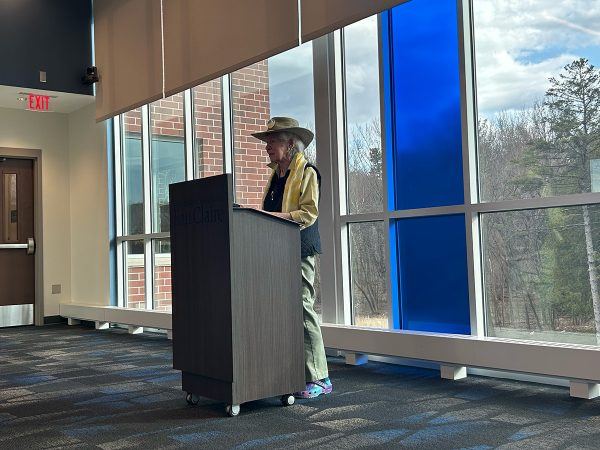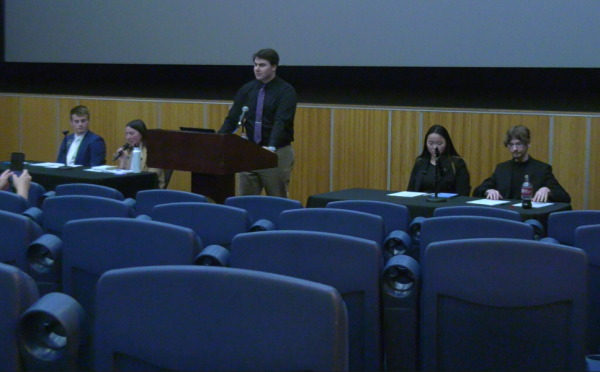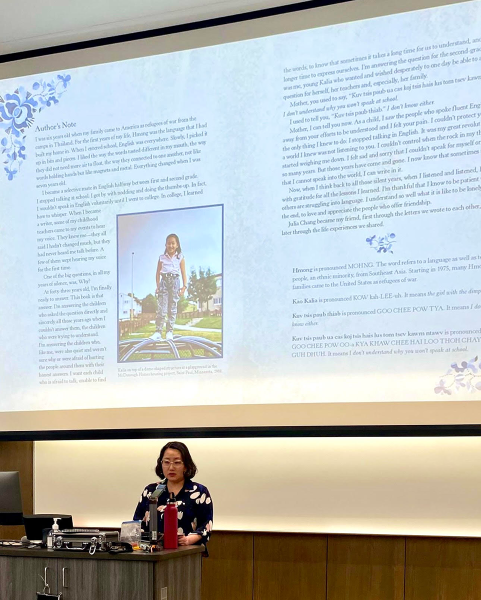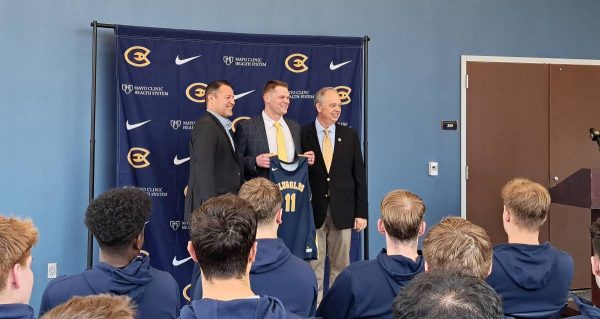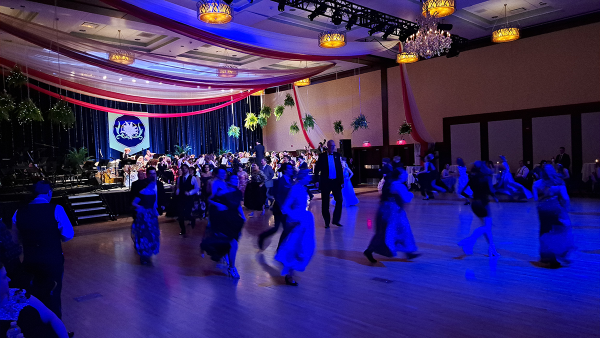9/11 and the War on Terror: in retrospect
Fifteen years later, veterans share their experiences, conclusions
More stories from Gabriel Lagarde
The year 1989 is of special significance to one non-traditional student on campus. It represents a time when a young Navy seaman dreamed of California shorelines, when it suddenly gives way to a life-altering experience.
Justice Varsho, a senior American Indian studies student in his final semester at UW-Eau Claire, was a young seaman apprentice at time, less than a year into his military career.
Weeks prior to being shipped out, Varsho expected he was going to be stationed on the west coast.
As it turned out, circumstances out of Varsho’s control were propelling him in a completely different direction.
“A group of us went to the coroner’s office to take shots and they asked where we were going. We said ‘California’ and they said ‘No, you’re not. These are all shots for diseases in Asia,’” Varsho said. “The day before I was supposed to leave, they told us we were going to the Philippines. I didn’t have any warning.”
Unbeknownst to Varsho — who had limited access to media during his training — the Philippines were in a state of chaos. Embroiled in a violent coup, the country was torn between the government of President Corazon Aquino and rebel supporters of fallen dictator Ferdinand Marcos.
This snapshot in Varsho’s life serves an example of a reality members of the U.S. military face during their tenures.
Jessica Traw, a human resource management student and a veteran of Kosovo and the Iraq War described the mentality each serviceman has to have 24/7.
“You have to have the adaptability. You don’t know what your day is going to bring,” she said.
With the 15th anniversary of 9/11, it should be noted Ground Zero represents more than the resting place of the World Trade Center. It also served as the starting point of numerous violent conflicts that have come to define more than a decade of American foreign policy: The wars in Iraq and Afghanistan, the conflicts in Yemen, Syria or Pakistan, and the events of the Arab Spring in 2011.
Varsho, Traw and three other servicemen-students to discuss the implications of 9/11 and the nation’s response to it. They range from young servicemen who were children when the twin towers fell, to veterans of multiple armed conflicts during decades in the service. Their answers varied greatly, indicating how individual experiences shape stances on issues, and how the ambiguous state of these conflicts offer no clear answers.
“The problem is that any time there is war, you can’t be the good guy,” Varsho said. “There is no good guy in war. There’s a winner and a loser.”
What was your motivation for joining the military?
For Henry Helland and Dennis Sloan, both members of the Army National Guard, and for Justice Varsho, a member of the U.S. Navy, the military opened doors to secondary education that were closed before enlistment.
Sloan, a junior human resource management student, said he looked to the military as a way to give his life structure and purpose on a day-to-day basis. After two years of service, Sloan said being part of the armed forces has become more than a means to keep himself busy.
Helland, a sophomore undeclared student, initially aspired to be a Navy Seal when he first graduated high school, but chose to become part of the National Guard on the advice of a friend, despite reservations of becoming a “puddle-jumper.”
“He was like ‘Before you go in and realize that you don’t want that or if you don’t succeed, you’re not going to get what you want.’” Helland said. “‘You should get your foot in the door, maybe think about college first.’”
Now, three years into his career, Helland spoke warmly of the National Guard and the opportunities it’s given him.
“If it wasn’t for this, I wouldn’t be in college,” he said. “I’d probably be working at a factory or doing something manual, possibly just logging with my father.”
Varsho, whose parents are both veterans of the Vietnam era, initially debated joining the Army before opting for the Navy in 1989. A self-described “bad student,” Varsho said he wasn’t ready to enroll in college and the Navy offered the best benefits.
“I knew that I wanted to travel. The Navy had the whole sea, the whole world,” he said. “I got to see Asia, Australia all the West Coast, and I really relished that chance.”
Varsho would continue this work until he left the Navy in 1993.
In comparison, Jessica Traw and Richard Dean initially joined the military as a result of legacies their military families ingrained in them from a young age.
Traw, an active duty member of the Air Force from 1997-2015, said she grew up a “military brat.” Both her parents were active military personnel and they raised Traw within an environment that emphasized discipline and duty. She said it was a natural choice to join the Air Force.
“I always knew I wanted to work with airplanes. I’m not big on boats,” she said. “The moment I graduated high school, that’s what I signed up for.”
Her career involved many conversations with younger airmen who were in the service to fast track their journey through college. Traw said these experiences inspired her to pursue a career in human resources when she retired last year.
Dean, a senior political science student and an Army infantryman from 1988-2010, who saw combat in the First Gulf War and served multiple tours in the Iraq War, based his life off his father’s.
“He was special forces guy. He was an infantry officer,” Dean said. “All these high-speed, dangerous guys would come over and my dad was the most dangerous among them. So I thought joining the army would make me like him. I looked in the mirror and that’s what I saw: a soldier.”
Could you describe a moment when the gravity of your deployment hit you?
For Varsho, the enormity of what his undertaking didn’t fully dawn on him until he told his mother over the phone about his deployment to the Philippines.
“My mom dropped the phone. My dad picked it up and asked ‘Where are you going?’ and when I told him, he got quiet and he said ‘Do you know what’s going on in the Philippines right now?’” Varsho said. “I told him I didn’t. He said ‘Navy sailors are getting stabbed in town, they’re getting stabbed at the main gates. They’re getting assaulted.’”
Traw had been deployed to various parts of the globe before her tour in Iraq in 2004.
“In Iraq, on base, we were mortared daily. We were taking cover all the time. I was driving on base. We were being mentored and I felt my vehicle shake. I wasn’t close to a ready bunker. When I got back to my shop, it hit me: ‘That was really close,’” Traw said. “The life flashes before your eyes. You wonder, ‘What am I doing with the rest of my life?’”
For Dean, it was two wars that he compared in his mind.
His time spent in Mosul, Iraq from 2003-04 left a strong impression of how the War on Terror differs from preceding conflicts. It was a fight with no large contingents, no forward edge and often no clear objective.
“The First Gulf War was really one-sided, it was like a video game. It was fought at night. We had every advantage. It was more a conventional war,” Dean said. “Later, during the War on Terror, when you got into a fight and you didn’t overmatch the enemy right away, they would pick the time and place of battle. You didn’t know who you were fighting until they’d attack you.”
Have your experiences as a member of the armed forces fundamentally changed you as a person?
Sloan criticized how the media portrays the military as a hyper-masculine culture that’s loud, inherently violent and self-obsessed.
“On TV, it’s all ‘Glory! Glory! Huah! Huah!’ But, that’s not what it is. Just looking at what these guys have to do just to reach (the warzone),” Sloan said. “Only about seven percent actually see combat. The rest of us are support. I spend all day working so they can be ready.”
Varsho said his experiences caused him to experience a loss of faith in humanity, regarding people with distrust.
“Even if you give someone the benefit of the doubt…you may end up with the losing end of the stick,” he said. “It takes me a long time to trust people, unless they’re veterans who have gone through that before.”
Dean said his more than two decades of experience in the military taught him to compartmentalize his life. He described the way he navigates these situations as wearing an assortment of hats, such as a “father hat” for when he needs to be caring and attentive with his family, or a “military hat” when he has to be detached, focused and efficient.
It also gave him a sense of perspective when he enrolled at UW-Eau Claire.
“Most of the things you encounter in college is within your control,” he said. “When you’re in the military and overseas, a lot of what happens to you is dictated to you by the enemy or by your superiors…You have to follow orders.”
Traw said that she is a member of the armed forces, born and raised, trained and — upon her retirement last year — an almost 18-year veteran of the service. It’s what she’s most comfortable with and her experiences haven’t changed that.
“My parents were both in the military. It is what I grew up around,” she said. “It wasn’t until I went to Wisconsin for high school that I realized everybody isn’t like me. My experience didn’t affect me in the same way. It’s different.”
Did the War on Terror change the culture of the United States?
In Sloan’s estimation, there is a great separation between the public and the War on Terror because of fewer boots on the ground. For many, the perception of war is not through the first-hand experience of loved ones who have fought on the ground, but through the prism of the media.
For Helland, it was an attack of 9/11’s scope, on American soil, that made war threatening and personal to the larger American populace. In his opinion, this led to our initial sense of righteous retaliation and a disillusionment with war.
“Before 9/11, Americans weren’t necessarily for war, but I don’t think they had quite the negative connotations until it was in our backyard,” he said. “Until you’re getting bombed or you’re getting attacked, you don’t really think about the consequences.”
This led to years and years of what Sloan described as reactionary policies and a political atmosphere of fear and distrust.
“The reason why [Donald] Trump doesn’t want to allow Islamic people into this country is for that reason…People don’t want it [9/11] to happen again. It’s changed how people feel about that part of the world, about that religion,” Sloan said.
Dean pointed to 9/11 and subsequent events in the War on Terror as an eye-opening experience for the United States.
“We’re more aware now that the way we act can have an effect, that it can embitter people to us,” he said. “Long before 9/11, we were doing things in the Arab world and around the globe that people were upset with us.”
However, Dean said that while the media portrays the Obama administration as more benevolent and reasonable than Bush’s, the current government is acting much in the same way as its predecessor.
“I don’t think the government is doing anything any different,” he said. “I think [they] haven’t learned their lesson.”
Knowing what you know now, having experienced what you’ve experienced, was it all worth it to you in the end?
For Varshno, every generation views the War on Terror (and war in general) differently. The Greatest Generation, those now aged 80-90 years old, may view it in a more patriotic light. The Baby Boomers, those now in the 50-70 range, would most commonly be against it. From his experience, those in their 40s and younger, aside from veterans, are against the war, protesting on many occasions.
Varsho said ultimately it may not matter what the motivations are if America is unwilling to accept the evils inherent in war in order to achieve the nation’s objectives.
“When I was still [in the Navy], I would have said yes,” Varsho said. “But, it’s tough for me to say that it is acceptable because of all the information out there. The question comes back to, if we’re really going to war, then we need to go to war to win.”
Sloan, Dean and Helland shared similar stances in that, while the United States was justified in going to war initially, the end result didn’t reflect the objectives.
Sloan said he could understand the sense of anger and need for retribution that dominated the American conscience in the wake of 9/11 — even to the point of referring to it as a necessary conflict, but he said much of the War on Terror caused more harm than good.
“The War on Terror didn’t have to happen the way it did…but there needed to be more thought to be put into it,” Sloan said. “You’re not taking a city from terrorists, you’re taking it from people who wanted nothing to do with it. This creates bad relationships with countries.”
Helland questioned whether the War on Terror was counterintuitive and perpetuated terrorism instead of fighting it.
“The people who actually get affected are the people that don’t support the radicals…For [eliminating radical elements], how many people we had to go through or potentially hurt or invade their homes when it wasn’t necessary?” he said. “Sure, we got a few of the leaders, but it was a recruiting tool for the people we had to go through, the families that didn’t support it.
Dean described the Iraq War as a situation where the United States entered with the right intentions, but failed to create an effective, long-term plan that could sustain itself in the region. In the end, the War on Terror may be considered a failure because we left the region in a state of flux.
“Responding [to 9/11] was important,” he said, “but essentially doing the regime change, establishing a democracy and hoping that it spreads and, in turn, creates an area that is safer for the U.S. and isn’t so violent — they did it poorly.”
Dean speculated that this may be because it’s impossible to impose values on another culture without the continual threat of violence. While a military presence can enforce the set societal parameters, the moment occupying forces leave the area, the locals will revert back to what they know, Dean said.
“You have to let nations come to that on their own,” he said. “These Arab nations that treat their women poorly, pretty soon they’re going to recognize that half their talent is disregarded.”
Traw said shifting American stances on the War on Terror pressured the government to withdraw troops prematurely, circumventing what they had accomplished.
This was the result of a populace that lost sight of why we were in the Middle East, Traw said.
“When 9/11 initially happened, the mentality definitely changed. Everyone was very much pro-American. We weren’t looking for this conflict, this came to us. America wanted us to react,” she said. “As time went on, viewpoints changed. People forgot what happened on American soil because they saw the number of deaths overseas and what was happening overseas.”
Traw said the increasing instability, re-emergence of radical elements and the rise of ISIS can be traced back to our unwillingness to stay and take ownership of the war.
Varsho said that in a situation where the ambiguity of war, coupled with a culture of fear and distrust, the motivations of why we’re in the Middle East are increasingly unclear compared to the rousing convictions we took with us to war in 2001 with al-Qaeda.
“There’s a lot of people questioning whether we should have been over there, whether it was a just war,” he said. “We can’t answer that.”


